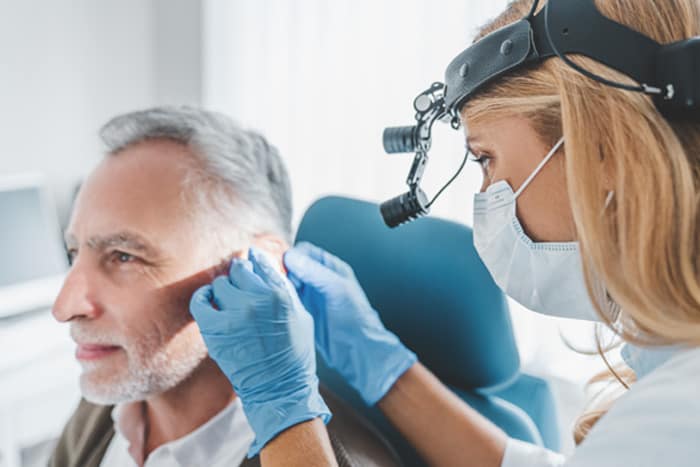Have you been noticing a change in your hearing abilities? Perhaps you’ve been struggling to follow conversations, or your world seems quieter than before. If so, you’re not alone. In Australia, one in six people is affected by hearing loss, a number expected to increase to one in four by 2050.
At Freedom Hearing, we believe in empowering you with the knowledge to make the journey towards better hearing health less daunting.
Understanding hearing healthcare can seem complex, especially when navigating a maze of audiology appointments, treatment options, and financial costs. We know that these complexities can sometimes lead to procrastination or avoidance of seeking your help.
This blog aims to take the mystery out of hearing healthcare. We’ll walk you through the process from recognising the need for hearing help to understanding the ongoing care and support.
We’ll also shed light on the associated costs and the financial assistance available to you as an Australian resident.
So, whether you’re embarking on this journey for yourself or assisting a loved one, we hope this guide gives you the confidence and understanding to take that first step towards better hearing and improved quality of life.
Let’s get started!

Recognising the Need for Hearing Healthcare
Acknowledging the presence of a hearing problem is the pivotal first step on your journey towards better hearing health. Many Australians wait years before they seek help, often because they don’t recognise the subtle changes in their hearing abilities. However, early detection can make a significant difference in the effectiveness of treatment and the overall quality of life.
Hearing Loss Symptoms
The signs of hearing loss often creep up slowly. You may start to notice:
- Trouble following conversations, especially in noisy environments
- Frequently asking people to repeat themselves
- Difficulties hearing on the phone
- A constant need to turn up the volume on the TV or radio
- Tinnitus – a persistent ringing or buzzing sound in your ears
- These symptoms can ripple into your life, causing frustration, social withdrawal, and even affect your mental health.
The Power of Early Detection
Despite the high prevalence of hearing loss, many people wait a lot before seeking help. A study from 2011 found that, on average, people with hearing loss wait around ten years before seeking help. Moreover, only 17% of those who could benefit from hearing aid use one, as per the World Health Organization.
Early detection can also potentially slow cognitive decline connected to hearing loss. Research from Johns Hopkins University found that untreated hearing loss increased the risk of dementia by 50% and depression by 40%.
The earlier we can detect hearing loss, the better the outcome for the individual – that’s the power of early detection. Recognising and addressing hearing problems as soon as they emerge allows for more effective treatment and can significantly improve the quality of life for those affected.
Initial Consultation
The initial consultation is your first formal interaction with an audiologist. This meeting will discuss your medical history, lifestyle, and the challenges you’ve been experiencing with your hearing. The consultation is an excellent opportunity to ask questions or express concerns.
Your audiologist will also explain the testing process, what it involves, and how it can help pinpoint the specifics of your hearing loss.
Your audiologist will guide you during the hearing test, ensuring you’re comfortable. All you need to do is respond to the instructions given.
The whole process is usually completed within an hour, and you can expect to receive your results during the same appointment.
Exploring Treatment Options
Once your hearing test is complete and your audiologist has a clear picture of your hearing abilities, it’s time to explore the various treatment options. The type and severity of your hearing loss will largely determine the best solution for you.
Hearing Aids
Hearing aids are the most common solution for managing hearing loss. They are electronic devices that amplify sounds to be heard more clearly. These devices have come a long way, and modern hearing aids are often discreet and sophisticated and can be tailored to meet your specific hearing needs.
Cochlear Implants
Cochlear implants might be a suitable option for those with severe to profound hearing loss. Unlike hearing aids, which amplify sounds, cochlear implants bypass the damaged part of the ear and stimulate the auditory nerve directly. They consist of an external part behind the ear and a second part surgically placed under the skin.
Australia is a pioneer in cochlear implant technology, with the globally recognised Cochlear brand headquartered right here.
Assistive Listening Devices
Apart from hearing aids and cochlear implants, assistive listening devices (ALDs) are also designed to help in specific situations. These include telephone amplifying devices, TV listening systems, and FM systems in classrooms or lecture halls.
The Importance of Individualised Solutions
It’s crucial to remember that each person’s hearing loss is unique, so the treatment must be tailored accordingly.
At Freedom Hearing, we offer individualised solutions, working closely with you to understand your lifestyle and listening needs. Through this personalised approach, we can guide you towards the most effective treatment options for your specific situation.
Embarking on this journey may seem overwhelming, but the goal is to improve your hearing and enrich your life. As you navigate through these options, remember that your audiologist is there to help and guide you every step of the way. You’re not alone in this journey.
Financial Aspects of Hearing Healthcare
Understanding the financial aspects of hearing healthcare is integral to your journey towards better hearing. While the cost can vary greatly depending on your hearing loss and the chosen treatment option, we aim to provide a transparent breakdown of the potential expenses.
Costs of Consultations and Testing
In Australia, an audiologist’s initial consultation and hearing tests can range from AUD $60 to AUD $120. However, these costs may be covered by private health insurance depending on your policy or even subsidised by the government if you meet specific criteria.
Meanwhile, Freedom Hearing offers a free hearing assessment that takes around 60 minutes and involves several checks designed to pinpoint hearing loss and measure the severity of your condition.
Hearing Devices and Fittings
Modern hearing aids can be pricey.
The cost depends on the type you choose. Basic behind-the-ear aids start at around $1,500. In-the-ear aids can cost more, usually between $2,500 and $3,000.
Many new hearing aids have extra features. These include Bluetooth and rechargeable batteries. Top-end models can cost as much as $4,500.
So, even basic hearing aids might be too costly for some Australians. That’s why funding methods matter. They help cover hearing aid costs, often with no extra charges.
Ongoing Care and Maintenance
Aftercare services, such as regular check-ups, cleaning, and maintenance of the hearing devices, are usually included in the initial cost of the hearing aids for a certain period. After this period, you may need to pay for these services separately.
Government Assistance and Health Insurance
In Australia, we’re fortunate to have government assistance programs like the Hearing Services Program, which provides eligible people access to free and subsidised hearing services. These services include comprehensive hearing assessments, fitting of hearing devices, and aftercare services.
Private health insurance may also cover part of your hearing aid costs, depending on your level of extra cover. It’s advisable to check with your provider for specifics related to your policy.
Financing Options
Understanding that hearing healthcare is a necessary but substantial investment, many audiology clinics, including Freedom Hearing, offer financing options to make the process more affordable. These options often allow you to pay for your treatment in installments rather than a large upfront sum.
Navigating the financial aspect of hearing healthcare can be overwhelming, but it’s essential to remember that the investment is in your quality of life. If cost concerns you, discuss it openly with your audiologist. Solutions and options are usually available to help make hearing healthcare accessible and affordable.
Ongoing Care and Support
Once you start using your new hearing aids or cochlear implants, it’s essential to have regular follow-up appointments with your audiologist. These appointments allow us to monitor your progress, make any necessary adjustments to your device, and ensure you’re getting the most out of your hearing solution.
Regular check-ups also allow you to discuss any challenges you might be facing or answer any questions. Sometimes, minor tweaks can make a significant difference in your hearing experience.
Device Maintenance
Proper maintenance is crucial to ensure your hearing devices function optimally for as long as possible. This includes regular cleaning, battery changes, and checking for any damages. While some of these tasks can be done at home, others require professional help, which is why routine visits to your audiologist are essential.
Counselling and Communication Strategies
At Freedom Hearing, we understand that adjusting to hearing aids or dealing with hearing loss can be challenging, not only physically but also emotionally. We provide counselling services to help you and your family understand and cope with hearing loss.
We also offer guidance on effective communication strategies to help you communicate better in different situations. This could include learning to lip-read, leveraging assistive technology, or making simple environmental changes to improve hearing conditions.
Emotional Support and Community
In addition to counselling, we believe in community support’s power. We provide opportunities to connect with others who are going through similar experiences. Hearing from others who have walked the same path can provide great comfort and camaraderie.
The journey to better hearing doesn’t stop when you walk out of our clinic with your new hearing aids. It’s an ongoing process of care and support, and we’re with you every step of the way.
At Freedom Hearing, we’re committed to ensuring that you hear better and live better. CLICK HERE to book your FREE hearing check.

